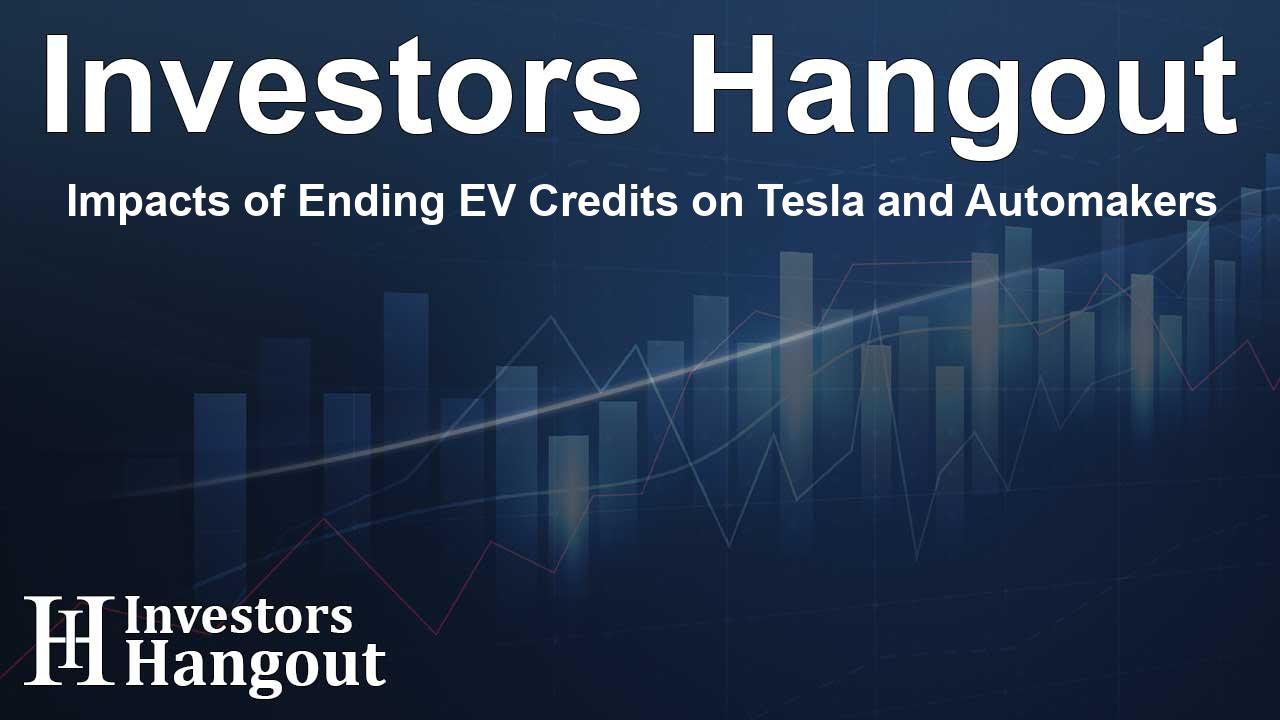Impacts of Ending EV Credits on Tesla and Automakers

Understanding the Impact of EV Credit Termination
In recent developments, the $7,500 Federal EV Credit officially came to an end. This shift has caught the attention of investors and analysts alike, sparking discussions around the implications for major electric vehicle players like Tesla Inc. (NASDAQ: TSLA) and traditional automotive manufacturers.
Ross Gerber Highlights a Sales Surge
Investor Ross Gerber voiced his insights on the social media platform X, emphasizing the recent surge in Tesla sales coinciding with the deadline for the EV credit. He noted, "Many new Teslas have been seen on the roads, primarily due to consumers rushing to take advantage of the credit. This indeed contributed to the quarterly performance positively."
Despite this optimistic tone, Gerber cautioned that this trend is not sustainable. He expressed concern that once the credit expired, the momentum would dwindle, foreseeing a challenging period ahead for Tesla.
Gene Munster's Perspective on Traditional Automakers
Gene Munster from Deepwater Asset Management also shared his observations following the end of the EV credit during an interview. He highlighted that while the credit had provided a temporary advantage to consumers, its discontinuation might trigger a slowdown in investment among traditional car manufacturers like General Motors Co. (NYSE: GM) and Ford Motor Co. (NYSE: F).
Munster expressed that many traditional manufacturers may have misjudged the market signals post-credit and are now faced with significant challenges in ramping up their EV production capacities. He indicated that without substantial investment, these companies could find themselves at a disadvantage in the evolving automotive landscape.
Manufacturer Strategies Alongside EV Credit Changes
In light of the new reality post-EV credit, both GM and Ford are exploring options to extend EV incentives, seeking to maintain consumer interest in electric vehicles. Reports indicate they might implement strategies such as facilitating down payments for dealers to ensure vehicles continue qualifying for existing incentives.
Future of EV Incentives in California
Beyond the federal landscape, California Governor Gavin Newsom confirmed that the state would not pursue additional incentives for electric vehicles despite the federal credit’s expiration. Newsom emphasized a focus on enhancing charging infrastructure to promote electric vehicle adoption rather than trying to compensate for the lost federal benefits. He termed the situation as fallout from federal decisions that have hindered EV growth.
Furthermore, as the Biden administration looks to recalibrate policies from previous administrations, several changes could influence how electric vehicle credits and regulations are managed moving forward. As of now, the EV credit's end represents a major turning point not just for Tesla but for the traditional automakers who are at a pivotal moment in their transition to electric vehicle production.
Challenges and Opportunities Ahead for Tesla
The end of the EV credit comes with both obstacles and opportunities for Tesla. While the elimination of the credit may dampen sales in the short term, it also forces Tesla to innovate and further enhance the value of its product offerings. Tesla's current market position allows it room for growth despite these changes, as it continues to leverage its production scale and technological advancements in autonomous driving.
Elon Musk's company will need to focus on addressing customer expectations in new models and existing offerings to sustain its growth trajectory. Industry analysts predict that Tesla may find its competitive edge not only in being a leading electric vehicle manufacturer but also in the development of its Full Self-Driving (FSD) technology, which may become crucial for future operational success.
As the automotive industry evolves, the landscape for electric vehicle incentives and adoption will likely undergo significant shifts. The actions taken by both Tesla and traditional manufacturers in response to the end of the EV credit will be vital in shaping the future of transportation and energy efficiency.
Frequently Asked Questions
What are the implications of the EV Credit termination?
The termination impacts sales and investment strategies among electric vehicle manufacturers and traditional automakers.
How has Ross Gerber responded to the sales uptick?
Gerber noted the sales increase before the credit expiration but warned that this rush would not continue thereafter.
What does Gene Munster believe about traditional automakers?
Munster feels they misinterpreted market signals and may struggle to invest in EV technology after losing the credit.
Are GM and Ford extending any incentives?
Yes, they are exploring strategies to extend EV incentives, such as facilitating dealer down payments.
What is the future of EV incentives in California?
Governor Newsom confirmed no additional incentives would be pursued, focusing instead on EV charging infrastructure improvements.
About The Author
Contact Evelyn Baker privately here. Or send an email with ATTN: Evelyn Baker as the subject to contact@investorshangout.com.
About Investors Hangout
Investors Hangout is a leading online stock forum for financial discussion and learning, offering a wide range of free tools and resources. It draws in traders of all levels, who exchange market knowledge, investigate trading tactics, and keep an eye on industry developments in real time. Featuring financial articles, stock message boards, quotes, charts, company profiles, and live news updates. Through cooperative learning and a wealth of informational resources, it helps users from novices creating their first portfolios to experts honing their techniques. Join Investors Hangout today: https://investorshangout.com/
The content of this article is based on factual, publicly available information and does not represent legal, financial, or investment advice. Investors Hangout does not offer financial advice, and the author is not a licensed financial advisor. Consult a qualified advisor before making any financial or investment decisions based on this article. This article should not be considered advice to purchase, sell, or hold any securities or other investments. If any of the material provided here is inaccurate, please contact us for corrections.
